Today I’m going to explain why the ukulele is easier to learn than the guitar, especially if you’re a newcomer to the world of fretted instruments.
I play both ukulele and guitar myself, and I can honestly say that the uke is more beginner-friendly.
Here’s a quick summary to start:
The ukulele is easier to play than the guitar because ukuleles are less intimidating, less expensive, and less complex. A Ukulele’s small size, soft strings, and special tuning make forming chords simpler and less painful on the fingers. Ukes are also more forgiving than guitars when mistakes happen.
I know this might sound a bit vague, but don’t worry, I’ll unpack each reason in more detail below.
Let’s get started!
Reason 1: The Ukulele Has A Less Painful Adjustment Period
Once you start playing, you’ll quickly realize that fretted instruments can be a pain – literally.
Smashing thin strings into a hard fretboard repeatedly with your delicate beginner’s fingers is going to feel uncomfortable at first no matter what. Your fingertips will have to develop calluses to handle this.
But there’s good news! Ukulele strings are much kinder to the fingers. They are made out of many different synthetic plastic materials, and none of them will ever be as brutal as the cold, hard metal strings of most guitars.
To sweeten the deal, ukuleles have thinner necks which means your hands will have less stretching to do.
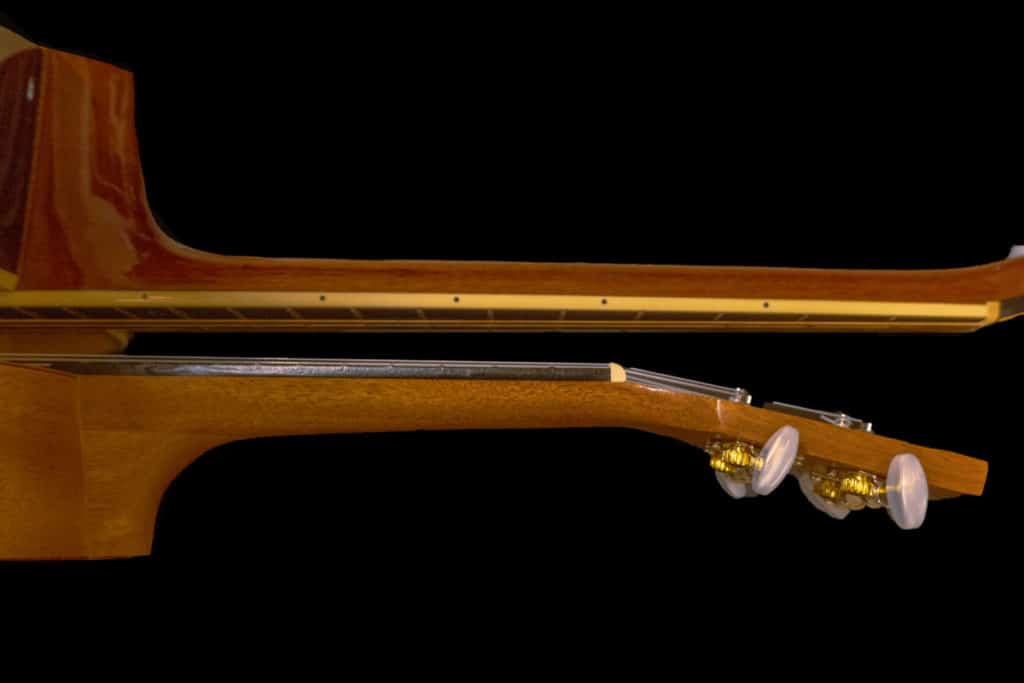
Forming different chord shapes requires your fretting hand to stretch in two directions at once – horizontally and vertically. On the wide neck of a guitar, this stretching can be very painful and can even cause hand cramps in the beginning.
The thin neck of the ukulele – combined with its shorter scale length, reduced string tension, and frets that are closer together – makes for a much gentler process as you learn the ropes of a fretted stringed instrument.
Reason 2: Common Chords Are Easier to Learn on the Ukulele
Learning to play chords is a big part of your fretted instrument journey. Why? Because chords are the building blocks of songs!
And there’s some great news. You can learn the basic chords found in most songs on your very first day of playing a ukulele. No joke! This means that you can play a lot of songs right away.
Here, let me prove it to you…
Because ukes have fewer strings, and because of the special way they are tuned, you will also have to press down on less strings to form chords compared to the guitar.
Likewise, it will also take you less time to figure out where to place your fingers and train your fingers to go where you tell them as you develop the muscle memory to form chord shapes without thinking. This process can be very frustrating on a guitar!
The chords C, G, Am, and F are used in a lot of popular songs and are quite easy to play on the ukulele. C and Am only require one finger!
The G chord uses three strings, but they are close together. And it’s still much easier than a G chord on the guitar!
The F chord requires fretting two strings, but on the guitar, it requires a full barre chord and fretting three strings besides.
Let me show you how different that really is:
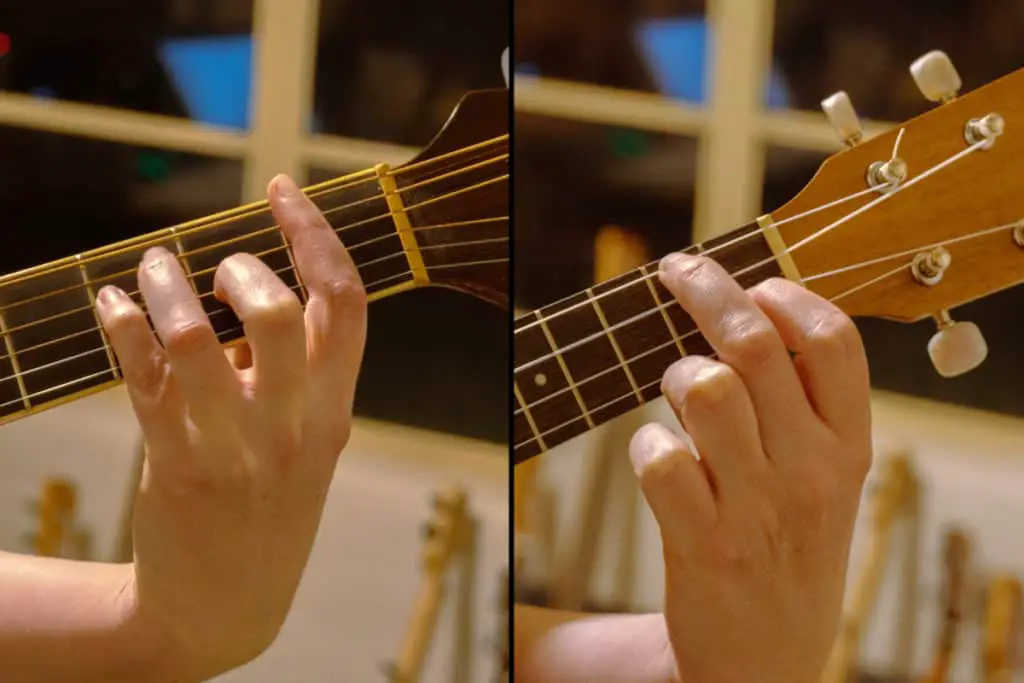
Even if you’ve never picked-up either instrument, I bet you can tell that the one on the right (the ukulele) looks WAY easier!
Reason 3: Chord Changes Are Easier on the Ukulele
Of course, playing chords is really only half the battle. You also have to quickly change between the chords to make songs. This takes practice and is tricky at first no matter what, but…
It’s much easier to change between chords on a ukulele than it is on a guitar.
Ukuleles have thinner necks, less frets, and the frets are closer together. The fretboard is a neighborhood rather than a whole city – and it’s a lot simpler to navigate.
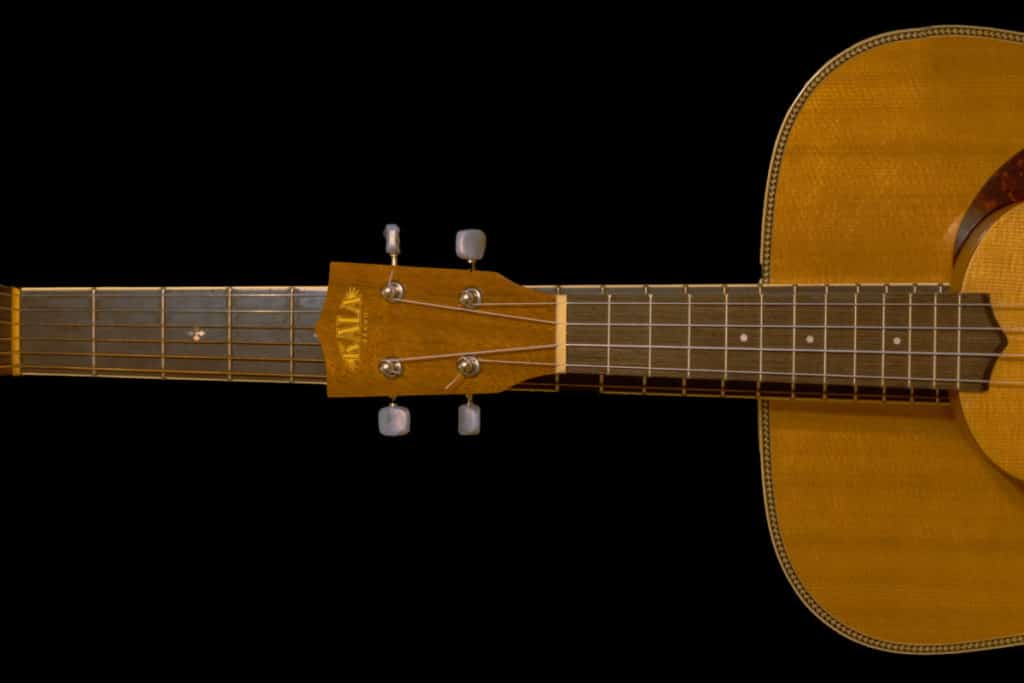
The strings themselves are easier to play due to their softer material and reduced tension. You also have two less strings to deal with on a ukulele.
Guitars, on the other hand, have wide necks. They also have longer necks with more frets and these frets are farther apart. Add to that the tight metal strings and the fact that you have six whole strings to wrangle and quickly placing your fingers and changing chords becomes much more difficult.
With just a little practice, you’ll have mastered the basic chords that make up most music on the ukulele and will be able to fairly quickly change between them. Learning these same chord changes on the guitar will take longer.
Reason 4: The Ukulele Uses a Simplified Tuning
Unlike a guitar, ukulele strings are tuned out of order such that the bottom G string is an octave higher than the deeper-pitched C string next to it. This is called re-entrant tuning.
This tuning puts ukes in the key of C, which just so happens to be the key most songs are written in. Re-entrant tuning also makes use of open (un-fretted) strings when forming chords.
Here’s a simple diagram that shows the ukulele string tuning and intervals between notes:
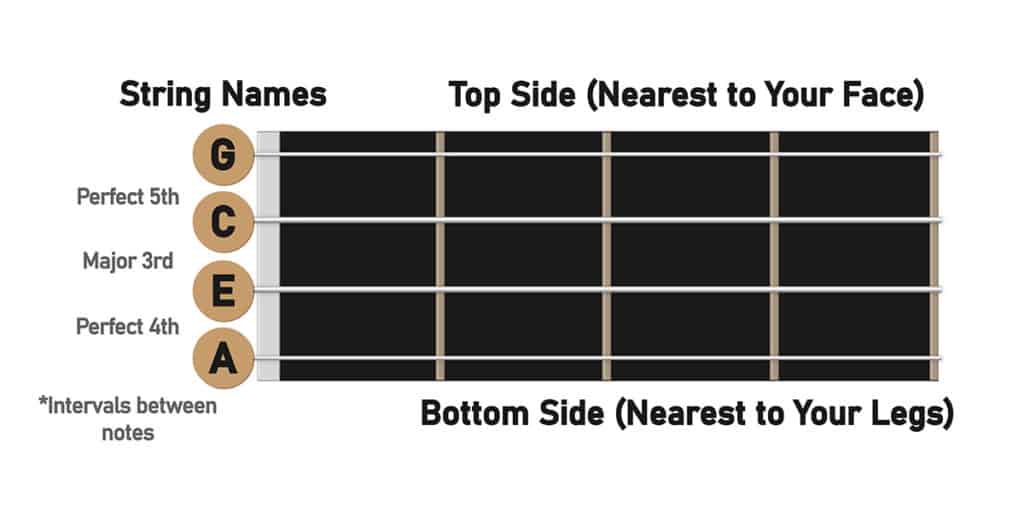
This is getting a little technical, but all this really means is playing most songs is inherently easier on the ukulele than it is on the guitar because the ukulele’s tuning is optimized for the majority of songs. Melody notes are therefore easier to find and playing chords requires fretting less strings.
And that’s not all! It also means that pretty much everything you do on a uke will sound alright – even mistakes.
Guitars are tuned linearly, which means the pitches go in order from lowest to highest with the strings. This makes it more versatile and complex, but can make it a little less intuitive for a beginner.
Here’s the guitar string tuning and intervals between notes:
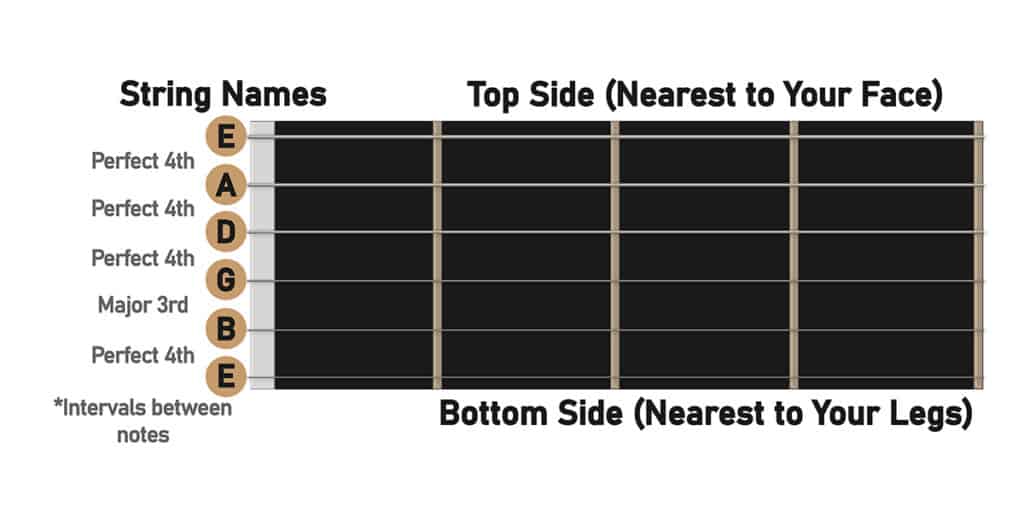
To illustrate this difference, strum a ukulele without fretting any notes. It sounds pleasing because it forms a chord (a C6 chord, to be precise). No fingers required! That’s a freebie!
Now, try the same thing on a guitar. It just doesn’t sound quite as nice – unless you’re into experimental jazz.
Reason 5: There is Less to Think About with a Ukulele
Ukuleles are more compact. They have less frets, the frets they do have are close together, and they only have four strings. All of this adds up to chord shapes, chord changes, single-note melodies, and scales being much easier. Less is more!
Guitars have a lot more moving parts than ukuleles – and as a result there is more to think about while playing.
Because guitars have six strings, you’ll usually end up using at least three fingers to play chords – and you’ll also have to figure out what to do with those unplayed strings while you’re doing this. Combining chord changes and strumming is also more challenging on a guitar for this reason.
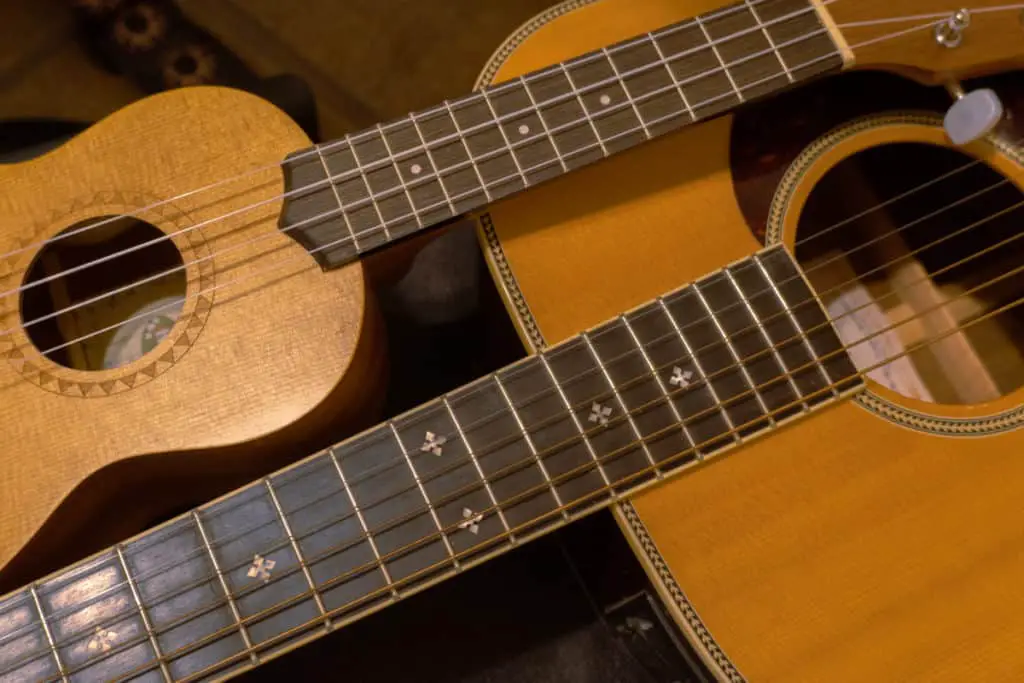
Having too much to think about can be overwhelming to a beginner. This can cause frustration and smashed guitars, and can even lead to quitting music forever. At the very least, it is no fun.
Ukuleles scale everything down just enough that you can learn the basics and actually start enjoying yourself faster. This makes you far more likely to stick with it!
And, as a bonus, all these skills transfer over to the guitar – or any other fretted instrument you might attempt later on.
Reason 6: The Ukulele is Less Physically Imposing
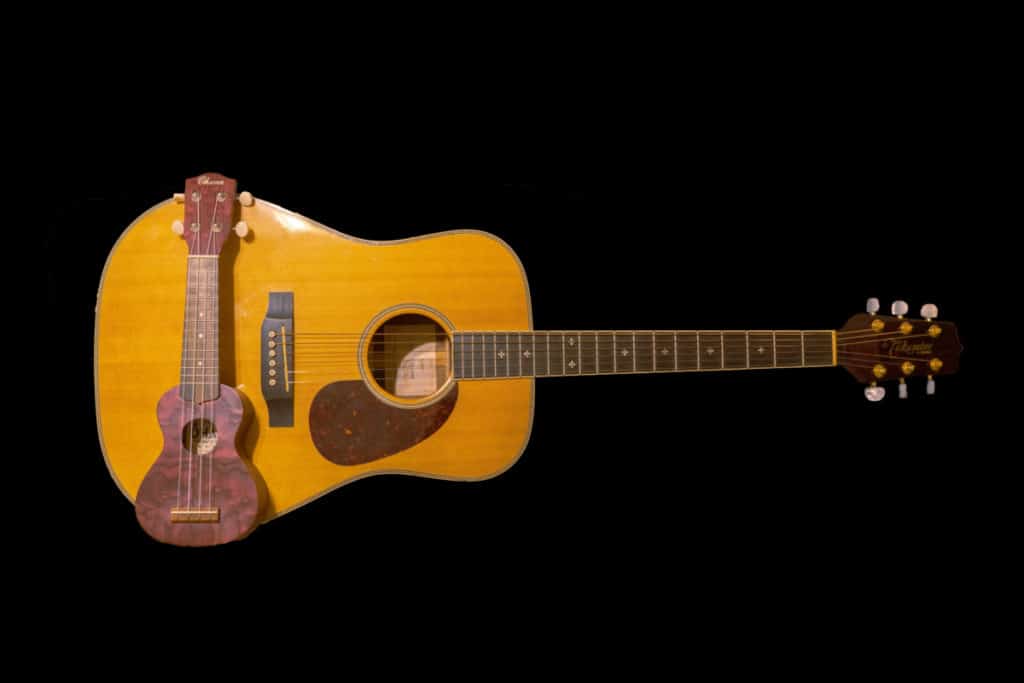
The biggest ukulele is still smaller than the smallest guitar. Say that ten times fast!
And why does size matter? Because it makes ukes easier to hold, travel with, and store. There’s that word again, “easier.”
Guitars are bulky. They are bigger and heavier, and many people find them challenging to hold and play for extended periods of time. Of course, posture and straps can help with this. But no matter how you spin it, ukuleles are lighter and slighter.
You can hold a ukulele for hours, with or without a strap. You can toss it in your backpack and take it camping. You can stash it in the overhead compartment on a plane. You can play it in your car (but obviously not while driving).
Some ukes even fit in your pocket, although that is admittedly taking it to an extreme. The point is, they are small and portable. They are easy to grab and go.
All of this adds up to creating more opportunities to practice – and more practice leads to progress!
Reason 7: There is Less Commitment Anxiety with the Ukulele
Starting a musical instrument journey can be anxiety-inducing. First, there’s the concern that you might not stick with it. And then, of course, there’s the money.
No matter how you spin it, a good starter ukulele will be cheaper than a halfway decent guitar. And it’s important to start out with an instrument that is well-made enough to stay in tune and produce desirable sounds – otherwise you definitely won’t stick with it!
Expect to spend $50 to $100 on a starter ukulele. In fact, $100 will actually get you a pretty top-notch instrument.
Because they are bigger and require more materials to make, the bare minimum you should spend on a beginner guitar is $200. To get a good one, you’ll have to shell out at least $350. And this is before you even talk about cases and accessories.
Once the initial investments start adding up, the pressure is on. And no one wants to learn under that much stress – especially before the process has even really started!
Mastering a new skill is hard enough as it is. Keep the stress, anxiety levels, and expectations low by spending less in the beginning.
Reason 8: The Ukulele is More Easygoing
Let’s face it, guitars are scary! Okay, not really. But they definitely carry the stigma of being an intimidating, unforgiving, and difficult instrument to learn.
Ukuleles, on the other hand, are known for being fun! They are used to make cheerful, mellow, and relaxing music. They are taken far less seriously.
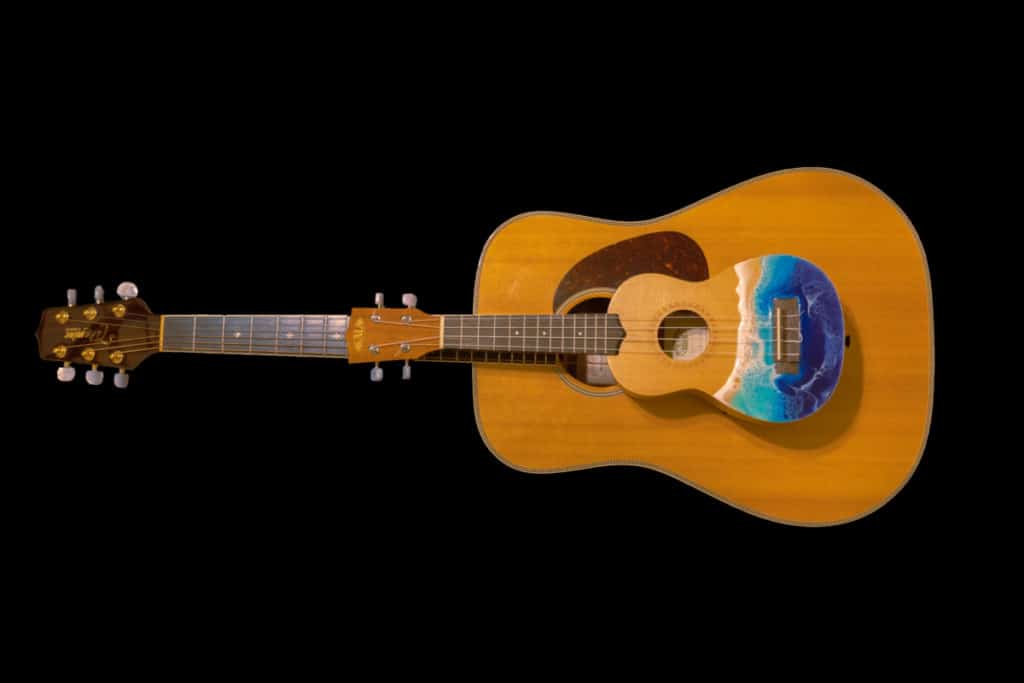
Why does this make them easier? Because learning the ukulele comes with no pre-conceived notions or expectations! They are still uncommon enough to be considered exotic. Heck, some people even think they are toys! (But don’t be fooled, ukeleles are serious instruments.)
An instrument should never be difficult to wrap your head (or fingers) around before you even start playing!
Reason 9: The Ukulele is More Forgiving
As a result of their unique tuning, simpler chord shapes, and gentler strings, ukuleles are a little easier to make good sounds on – even for a complete beginner.
You can play a three-chord song pretty quickly with a fraction of the practice it would take to do the same on a guitar – and it will sound pretty good even with a few mistakes here and there.
Ukes are simply more forgiving instruments than guitars. This means that if you do a sloppy chord change or don’t press hard enough on the strings the sounds produced won’t be completely cringe-worthy. (Not that I’m encouraging you to develop bad habits!)
Guitars, on the other hand, can sound pretty jarring until you perfect a technique. Because their strings have higher tension, they need to be pressed down pretty hard to sound right. Anything less and you’ll experience considerable string buzz.
To make matters worse, guitars are bigger and louder so the mistakes are amplified.
This can be especially embarrassing and demoralizing for beginners. Being able to feel some enjoyment and encouragement while practicing goes a long way for your sanity. It also makes it more likely that you’ll stick with it.